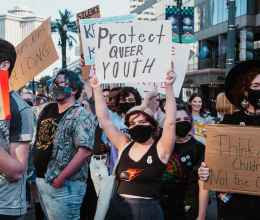
The ACLU of Georgia opposes SB 180 because it omits the Establishment Clause that is requisite to First Amendment religious protection. This omission could create a license to discriminate against LGBTQ+ communities and religious minorities.
- First Amendment protections of religion are predicated on two principles: the individual right to free exercise of religion without substantial governmental burden (Free Exercise Clause) and the government’s inability to establish or endorse any particular religion (Establishment Clause).
- The free exercise and establishment clauses are intended to work in tandem to help prevent religious-based discrimination, protection that is compromised when only one of the principles is present, as is the case with SB 180.
- By omitting the Establishment Clause, SB 180 could advance restrictive, extremist policies and actions under the guise of “religious freedom.”
- SB 180 does not mirror the federal RFRA bill which passed in 1993. Federal RFRA included provisions addressing both religious freedom clauses.
- Florida, South Carolina, Virginia and Illinois have all passed RFRA legislation that includes both clauses.
- In Kennedy v. Bremerton, the Supreme Court’s most recent decision regarding free exercise and government establishment, the Court specifically says that these clauses have “complementary purposes” not warring ones.




